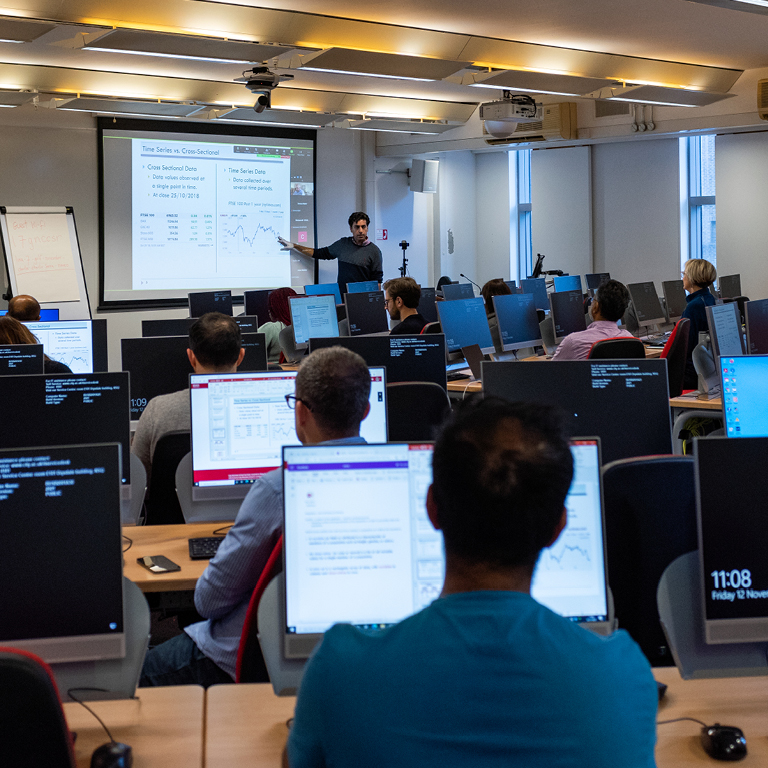Digital Supply Chain Management MSc

Key information
Duration: 12 months
Attendance mode: Full-time
Fees: From £17,000 (more information)
Location: Bunhill Row
Start of programme: September 2024
Application deadline: Rolling applications
Entry year: Showing course information for 2024
Ranked within top 10 globally in QS for Thought Leadership and within top 20 for Alumni Outcomes
Overview
Digital Supply Chain Management MSc Who is it for?
Our Master’s in Digital Supply Chain Management is perfect for you if you want to make a career in, or are curious about, ensuring that products and services reach customers at the right place and at the right time.
You have an interest in supply chains and their digitalisation, and are looking to build a solid foundation in the various aspects of managing the supply chain and learn about the latest developments in the field.
This course is specifically designed for you if you are a new graduate with little or no exposure to supply chain management or an early career supply chain professional. You want to improve your ability to think analytically to solve current and complex supply chain problems. You will need to hold an upper second-class degree or equivalent in a subject, such as business, economics, engineering or social sciences.
World leading alumni
A research paper from Alumna Gabriella Hastig and Bayes faculty member Mohan Sodhi was recently selected in the Financial Times list of most influential papers published in Production and Operations Management.
Why choose this course?
- Develop analytically driven decision-making skills for managing digital supply chains
- Understand how to execute the supply chain strategy of a business
- Gain valuable international experiences on supply chain electives in places such as Bologna
- Interact with industry experts and supply chain leaders through the modules and careers events
- Become part of our thought leading alumni community, a recent student's thesis as named as among the most influential of the past 30 years
- Network with global alumni via our Supply Chain Management society and LinkedIn members-only group.
Course objectives
In our Digital Supply Chain Management MSc, you will gain a solid understanding of the latest thinking and practices within supply chain management. You will build the knowledge to identify risks and opportunities and learn how to think strategically, analytically, and creatively about supply chain challenges to advise organisations on managing them.
Your studies will be based on the most recent academic research and up-to-date business standards, and cover the vital skills for this most global of sectors, including cultural sensitivity, self-awareness, effective business communication, time management, and resilience. You will also be equipped with advanced analytical, financial, and consulting knowledge.
You will be exposed to the current conversations in supply chain management through modules on digitalisation, sustainability, financing, and risk management.
With close ties to major industry players, electives taught by experienced practitioners and accreditation from the Chartered Institute of Logistics and Transport UK (CILT), and the Chartered Institute of Procurement & Supply (CIPS), this course gives you an overview of digital supply chains. It is an essential step to a successful career in supply chain management.
 "The Business School (formerly Cass) was one of the main universities in the UK that had a master’s specialising in supply chain management, and who would not love to study in London? I am now working as a Supply Chain Manager for Amazon Fresh.
"The Business School (formerly Cass) was one of the main universities in the UK that had a master’s specialising in supply chain management, and who would not love to study in London? I am now working as a Supply Chain Manager for Amazon Fresh.
As the Supply Chain Manager, you are the bridge between retail, the vendors and the FC’s. A career in supply chain means there is never a dull moment and you are left to work with different issues every day."
- Bola Jabitta
Teaching staff
The teaching staff on the MSc in Management have many years of practical experience working in industry and are also world-class researchers in their fields.

Course content
The course commences in September with a Foundations of Management workshop which prepares students with some of the concepts necessary to complete the course and includes careers and professional skills development sessions.
On the Digital Supply Chain Management master’s course, you will:
- Learn from module instructors who are recognized for their thought leadership and teaching excellence and who have real-world working experience with companies that is shared in class
- Engage with academics that are following best practice for teaching operations and supply chain management according to higher education literature, and employ experiential learning activities such as simulation games
- Be able to choose from a wide variety of elective modules, that are mostly delivered by practitioners in the field with decades of experience working in the sector
- Take international electives where you take a course offered in another university worldwide
- Benefit from career fairs, alumni and other networking events and conferences that help you succeed in your career. Past guests include executives from Banco Santander, British KPMG, LiquidX, Visa, British Petroleum (BP), Aerospace Engineering (BAE)..
Course structure
Programme content is subject to change. We regularly review our module offering and amend to keep up to date and relevant.
Induction weeks
All of our MSc courses start with two compulsory induction weeks which include relevant refresher courses, an introduction to the careers services, and the annual careers fair.
Term 1
Five core modules
Digital Supply Chain
- 15 credits
- 30 hours over ten weeks in lectures
- 12 hours per week self-directed study.
This module introduces you to the frontiers of digitalisation in supply chains. The key technologies behind modern supply chain designs are highlighted and their impact on how products and services are produced and delivered are analysed.
You will be familiarized with high-level strategies for digitalisation and concrete applications in areas such as manufacturing, supply chain management, and service delivery.
Analytics for Supply Chain Management
- 15 credits
- 30 hours over ten weeks in lectures
- 12 hours per week self-directed study.
This module introduces you to some important methods relevant to supply chain management from the fields of analytics. Many problems in today’s business world are often too complex to rely simply on intuition and common sense.
The application of analytics is critical for firms to improve the quality of business decisions by grounding those decision in analyses of available data and quantitative methods.
This module investigates principal analytical methods for understanding data and guiding decision-making related to various aspects of managing a supply chain.
Supply Chain Fundamentals
- 15 credits
- 30 hours over ten weeks in lectures
- 12 hours per week self-directed study.
This module will ensure that you have a strong foundation to understand the more specialist supply chain management concepts and frameworks, This module will expose you to a range of basic and fundamental supply chain related concepts as well as the global and relevant supply chain management cases.
Some of the contemporary supply chain management (SCM) issues, such as digitalisation, sustainability, risk management, will be also covered briefly.
Business Process Management
- 15 credits
- 30 hours over ten weeks in lectures
- 12 hours per week self-directed study.
The objective is to develop an understanding of how managers can design, analyse, measure, and improve processes to improve an organisation’s performance and attain long-term competitive advantage.
This module therefore takes a detailed look at the responsibilities, issues and decisions required to manage these business processes within an organisation effectively.
Essentials of Accounting and Finance
- 10 credits
- 18 hours over ten weeks in lectures or workshops
- 8 hours per week self-directed study.
The aim of this module is to equip you with an understanding of the most common accounting and finance techniques and practices and will include the use of published company reports and accounts, and other internally generated information, that enables management to make decisions and control operations.
Term 2
Five core modules
Sustainability in Digital Supply Chains
- 10 credits
- 18 hours over ten weeks in lectures
- 8 hours per week self-directed study.
In this module, you will learn about supply chain sustainability and the complex ethical, social, and environmental responsibilities of business organisations towards a range of stakeholders.
You will also examine the challenges and requirements of building sustainable products and sustainable supply chains across a wide range of contexts with a focus on the practical application to real-world business situations.
Purchasing and Supply Management
- 15 credits
- 30 hours over ten weeks in lectures
- 12 hours per week self-directed study.
In this module, you will learn about digital procurement.
Through the examination of core procurement principles, frameworks, and tools, you will gain an understanding of how to plan and execute a procurement strategy that supports corporate goals and broader business objectives. You will learn about the role of integration, data, and analytics in digital procurement.
You will also observe various digital technologies used in procurement that create opportunities for process automation, frictionless supply chain collaboration, and smarter procurement based on data science.
Supply Chain Finance and Risk Management
- 15 credits
- 30 hours over ten weeks in lectures
- 12 hours per week self-directed study.
The module aims to provide you with a profound understanding of the role of finance and risk management in supply chains, including the specific technologies that are used by the industry and banks. More specifically, you will explore various supply chain finance related issues such as:
- working capital optimisation with a focus on the role of technology in managing receivables, payables and inventories
- trade credit and technology-based financing techniques such as reverse factoring and dynamic discounting
- risk management strategies including the identification, assessment and mitigation of operational as well as financial risks within the supply chain using digital solutions.
All these topics have in common that they are enabled by innovative technologies that are becoming increasing popular for managing digital supply chains.
Machine Learning for Logistics
- 15 credits
- 30 hours over ten weeks in lectures
- 12 hours per week self-directed study and group work.
This module takes a detailed look at the decisions managers need to make about logistics and supply chains. The module provides conceptual, analytical and practical insights into the effective management of supply chain in all organisations, in both the private and the public sectors.
The module is concerned with large and small organisations from all over the world. This module introduces you to the analytical techniques from the discipline of management science required to be able to do this.
Professional Development Skills
- 15 credits
- 30 hours over ten weeks in lectures
- 12 hours per week self-directed study.
The aim of this module is to strengthen the behavioural, analytical, and methodological skills that will assist you in applying the concepts you have learned through your studies into practice.
The module includes topics on leadership, consulting skills and research methods to help you become a well-rounded manager.
Term 3
You will choose to do a Business Research Project and one elective, or choose to study four electives
Business Research Project
The optional Business Research Project will be of approximately 8,000 words. This offers an opportunity to specialise in a contemporary supply chain topic related to students' future careers. The Project should be based on independent research either in the context of a single organisation or using third-party sources.
You are encouraged from the start of the course to think about a topic for your Project. A member of academic staff supervises the project, and you may choose whom you would like to work with.
The Project must be submitted by the end of August. Company sponsored projects are encouraged and a few such projects may be available.
Many students use this opportunity to complete a project in conjunction with an organisation they might want to work for.
This gets your foot in the door and can lead to permanent employment post programme, whilst earning course credit.
Electives offered in 2022
- Ethics, Society & the Finance Sector
- FinTech - Financial Services in the Digital Age
- Negotiation Skill for Multidiscipline Managers
- Practicing Management in the Digital Age
- Project Leadership
- Retail Supply Chain Management
- Fintech in Shipping & Energy Trade and Finance
- Shipping Risk Management
- Strategic Service Management.
International electives
- Creating Value with Suppliers (taught in Bologna, Italy)
- Procurement (taught in Mannheim, Germany).
Please note that electives are subject to change and availability.
Download course specification:
Digital Supply Chain Management MSc [PDF]Assessment methods
Term dates
Term dates 2024/25
- Induction: 9th September 2024 - 20th September 2024
- Term one: 23rd September 2024 - 6th December 2024
- Term one exams: 6th January 2025 - 17th January 2025
- Term two: 20th January 2025 - 4th April 2025
- Term two exams: 21st April 2025 - 2nd May 2025
- Term three - international electives: 5th May 2025 - 16th May 2025
- Term three: 19th May 2025 - 4th July 2025
- Term three exams: 7th July 2025 - 18th July 2025
- Resits: 11th August 2025 - 22nd August 2025
- Additional resit week - tests only: 25th August 2025 - 29th August 2025.
Timetables
Course timetables are normally available from July and can be accessed from our timetabling pages. These pages also provide timetables for the current academic year, though this information should be viewed as indicative and details may vary from year to year.
Please note that all academic timetables are subject to change.

Fees & funding
UK/Home fee
September 2024 entry
£17,000
MSc
Tuition fees are subject to annual change.
International fee
September 2024 entry
£31,000
MSc
Tuition fees are subject to annual change.
Deposit: £2,000 (usually paid within 1 month of receiving offer and non-refundable unless conditions of offer are not met)..
First installment: Half fees less deposit (payable during on-line registration which should be completed at least 5 days before the start of the induction period)..
Second installment: Half fees (paid in January following start of course).
Scholarships & bursaries
Scholarships, sponsorships, loans and other funding could support your education at Bayes Business School.
Learn about the cost of living as a Bayes student in London.
Scholarships
We have a range of scholarships for Master's degrees at Bayes Business Scool. Most scholarship applications for 2024/25 year of entry will open in January 2024.
View our scholarships and fundingOther funding opportunities
Scholarships are very competitive, you may wish to look other options for funding, including the government PG Loan.
View other funding optionsSponsorship
Students on the course who are sponsored in full or in part by their employer will need to complete a sponsorship form as part of the application process.
View our sponsorship guidanceCareers
On your postgraduate course in Digital Supply Chain Management you’ll build an excellent strategic understanding of supply chains, the most up-to-date research and innovative business practices, and analytical and consulting skills that are in demand across many industries.
You’ll be well equipped for a successful career in supply chain management and for specialist finance positions in the banking and insurance sectors. You’ll also be ready for roles in operations, sales, procurement, consulting, and professional services firms.
Our careers team will guide you through your career planning with advice, workshops and opportunities to meet potential employers across the industry.
Our graduates
Previous and recent graduates have secured positions such as:
Job Titles
Our most recent graduates:
(Data provided from alumni who completed the annual destination data survey for 2021/22)
- Global Operations Specialist
- Supply Chain Executive
- Allocator – Merchandising
- Business Analyst
- Customer Success Manager
- Consultant.
Previous graduate job titles have also included:
- Analyst
- Associate
- Procurement Coordinator
- Supply Chain Graduate
- Sustainability Consultant.
Employers:
| AB InBev | Amazon |
| Arcadis | Bearing point |
| Bosch | Coca Cola |
| Doloitte | DHL |
| Fedex | Flexport |
| General Electric | General Mills |
| Jimmy Choo | Johnson & Johnson |
| KPMG | Liebherr |
| LVMH | Sainsburys |
| Ted Baker | Tesco |
Alumni stories
Entry requirements
- A UK upper second class degree or above, or the equivalent from an overseas institution
- Work experience is not a requirement of this course.
English language requirements
If you have been studying in the UK for the last three years it is unlikely that you will have to take an English language test.
If you have studied in the UK at degree level for less than three years (e.g. 3+1, 2+1, 2+2, etc.) you will be required to provide the results of an approved English language test and possibly resit the test to meet our academic entry requirements.
Full list of approved English language tests/qualifications and minimum requirements.
Apply
Please see our Application Guide for details of the documents you will need to supply as part of your application, and other useful information.
We cannot comment on individual eligibility before you apply. We can only make a decision on your application once it is fully complete, with all requested information received.
Frequently asked questionsTerms and conditions
Students applying to study at Bayes Business School are subject to City, University of London's terms and conditions.
Student life
We are located right in the heart of London. Being a student at City allows you to take advantage of all that London has to offer.
London is continually ranked as one of the 'Best Student Cities' in the world to study within (QS, 2019).
-
Have a question about student experience at Bayes?
Talk one-on-one with a student who is currently studying at Bayes.
Contact us
Speak to one of our staff from Master's programmes teams.



